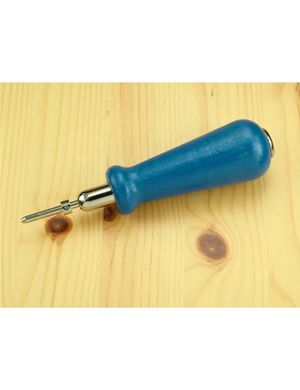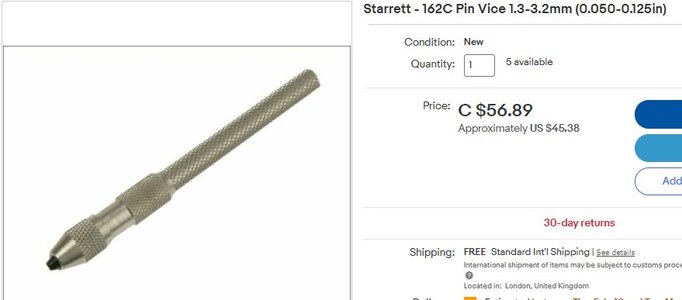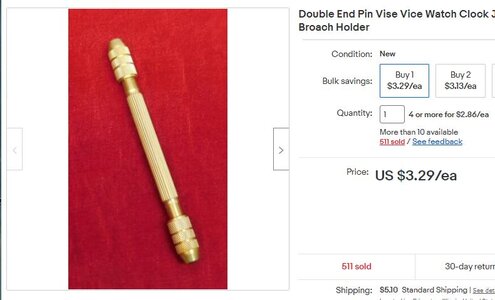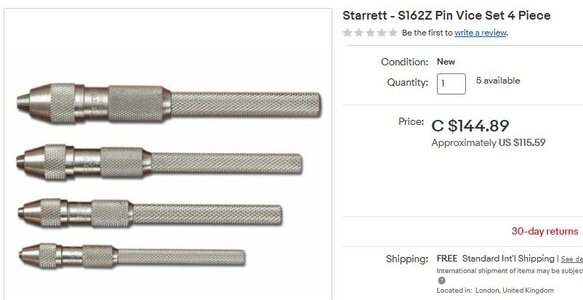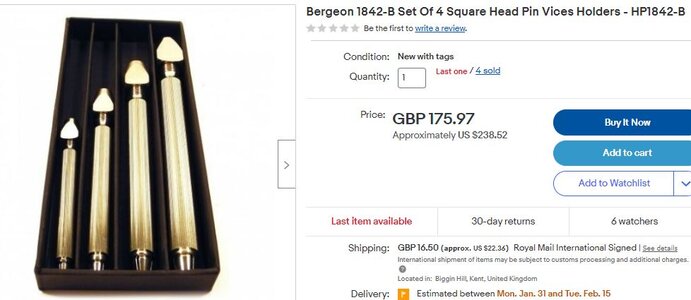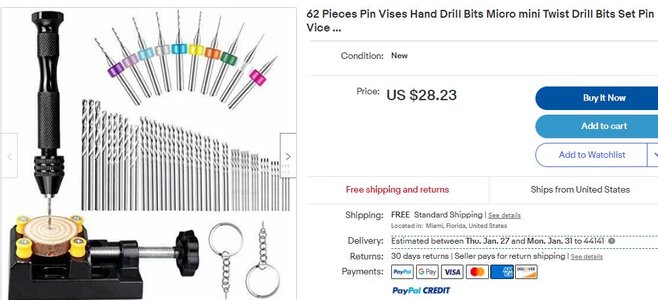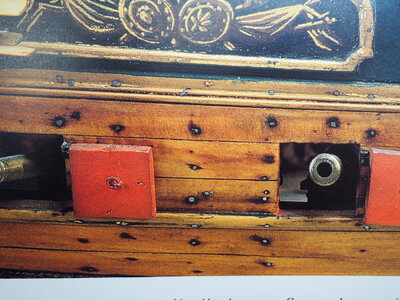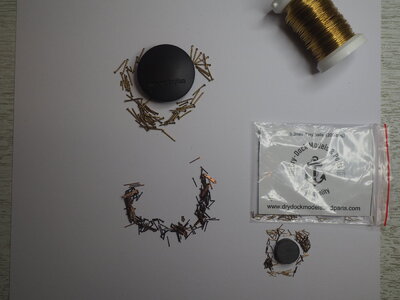-

Win a Free Custom Engraved Brass Coin!!!
As a way to introduce our brass coins to the community, we will raffle off a free coin during the month of August. Follow link ABOVE for instructions for entering.
You are using an out of date browser. It may not display this or other websites correctly.
You should upgrade or use an alternative browser.
You should upgrade or use an alternative browser.
brass nails
- Thread starter Dave Stevens (Lumberyard)
- Start date
- Watchers 13
- Joined
- Dec 1, 2016
- Messages
- 6,338
- Points
- 728

i started wooden ship model building back around 1965 i was building plastic kits since the mid 1950s. At the time the only kits available had solid carved hull there were no plank on frame or plank on bulkhead kits in the US at the time. so the idea of planking a hull was not heard of let along treenailing the planks. If memory serves me i believe it was Harold Hahn who introduced the first plank on frame models to the hobby through his articles in the Nautical Research Journal.
Hahn got the idea of using pegs from Robert Bruckshaw it was Bruckshaw that introduced Hahn to the "admiralty style" of model building. Looking at a Bruchshaw model you can clearly see the oversized use of treenails
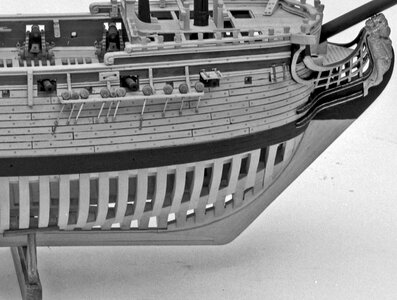
The question is where did Bruckshaw come up with the idea? From the Navy Board Ship Models from Franklin in his book tells us early models used wooden pegs, brass and copper nails.
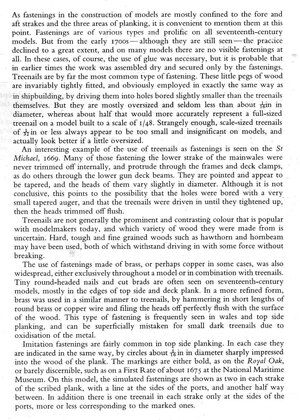
Even though fastening did later fade away from the admiralty models it was Hahn who "stylized" the look in the hobby. You can see the oversized scale that was used by Hahn and his models look like he tossed a bag of poka dots at the model.
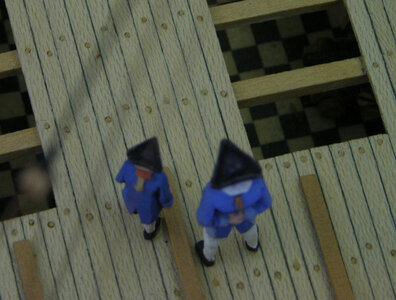
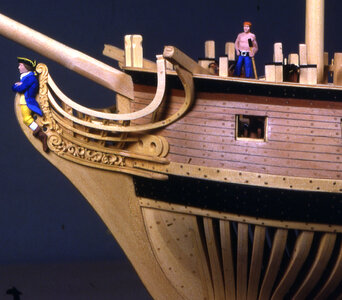
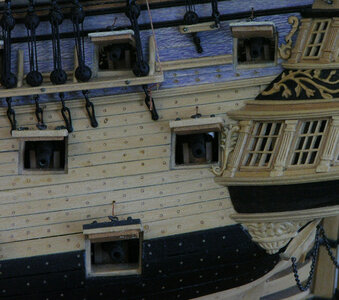
Both Harold Hahn and Robert Bruckshaw were the rock stars of the hobby and promoted by the Nautical Research Guild. Whatever they did was the gold standard of the time. What got them to stardom was the sheer quality of their work which by far overshadowed the use of stylized out of scale wooden pegs peppering their models.
Who knew?
at the time there was no logging on and googling searches of treenails or how wooden ship are built. The modeling community only source of information was a couple magazines and the NRG journal publishing articles by other model builders, there was a huge gap between the hobby and the academic circle of marine archaeology, so hobby builders took for granted if this is what the master builders are doing it must be correct.
Over time the used of out of scale wooden pegs became a model building style to show maybe the determination of a builder to show he spent the last 90 hours making little pegs just like the master builders did.
today with far more information we learned how it really was done with copper and iron bolts and spikes and not these wooden pegs. Is it time to break tradition and up grade?
Hahn got the idea of using pegs from Robert Bruckshaw it was Bruckshaw that introduced Hahn to the "admiralty style" of model building. Looking at a Bruchshaw model you can clearly see the oversized use of treenails

The question is where did Bruckshaw come up with the idea? From the Navy Board Ship Models from Franklin in his book tells us early models used wooden pegs, brass and copper nails.

Even though fastening did later fade away from the admiralty models it was Hahn who "stylized" the look in the hobby. You can see the oversized scale that was used by Hahn and his models look like he tossed a bag of poka dots at the model.



Both Harold Hahn and Robert Bruckshaw were the rock stars of the hobby and promoted by the Nautical Research Guild. Whatever they did was the gold standard of the time. What got them to stardom was the sheer quality of their work which by far overshadowed the use of stylized out of scale wooden pegs peppering their models.
Who knew?
at the time there was no logging on and googling searches of treenails or how wooden ship are built. The modeling community only source of information was a couple magazines and the NRG journal publishing articles by other model builders, there was a huge gap between the hobby and the academic circle of marine archaeology, so hobby builders took for granted if this is what the master builders are doing it must be correct.
Over time the used of out of scale wooden pegs became a model building style to show maybe the determination of a builder to show he spent the last 90 hours making little pegs just like the master builders did.
today with far more information we learned how it really was done with copper and iron bolts and spikes and not these wooden pegs. Is it time to break tradition and up grade?
- Joined
- Oct 17, 2020
- Messages
- 1,687
- Points
- 488

Questi chiodi li uso da circa 40 anni sono di ottone, li consiglioI perni finissimi Amati da 10 mm #4136/10 sono i migliori chiodi che ho usato poiché entrano anche nel legno duro senza spaccarlo e con il minimo attrito. Puoi spingerli dentro o picchiettarli con un martello. Altri spilli di Amato che non sono specificatamente etichettati come "finissimi" e sono troppo spessi. Cerca tutti i fornitori di modellini di navi online per il miglior prezzo. Ecco alcuni link:
Cornovaglia modellini di barche nel Regno Unito
Kit modello di nave in legno negli Stati Uniti
View attachment 279314
Avrai anche bisogno dello strumento di spinta del perno giusto. Quello a destra è per spilli fini con teste piccole ed è quello che vuoi. Quello a sinistra è per spilli con la testa più grossa e più grande. Ho due spingichiodi, ma non ricordo dove li ho comprati.
View attachment 279313
- Joined
- Apr 21, 2018
- Messages
- 859
- Points
- 353

That Archimedes drill looks very well made. Thanks for sharing that.
- Joined
- Dec 1, 2016
- Messages
- 6,338
- Points
- 728

- Joined
- Dec 1, 2016
- Messages
- 6,338
- Points
- 728

Hi Dave!
In museums you can see often nailed models. This is one of the reasons why many model builders want to do this. It is not necessary, because modern adhesives hold very well. In some places, nails (bolts) are quite useful to hold important components properly or even the smallest nails on rudder hinges. For most modelers, a model with the smallest nails or wooden plugs is also a "feast for the eyes".
Best regards
Thomas
In museums you can see often nailed models. This is one of the reasons why many model builders want to do this. It is not necessary, because modern adhesives hold very well. In some places, nails (bolts) are quite useful to hold important components properly or even the smallest nails on rudder hinges. For most modelers, a model with the smallest nails or wooden plugs is also a "feast for the eyes".
Best regards
Thomas
- Joined
- Apr 21, 2018
- Messages
- 859
- Points
- 353

Dave, as usual, often it's down to quality.....you get what you pay for.
However, over 20 years ago I bought a cheap set of 4 pin vice (around $5) which have done everything I asked of them.
That set, whatever its possible shortcomings, is a no brainer. I'd start there. Nothing to lose.
With all your experience I can't believe you got by without a pin vice until now.
However, over 20 years ago I bought a cheap set of 4 pin vice (around $5) which have done everything I asked of them.
That set, whatever its possible shortcomings, is a no brainer. I'd start there. Nothing to lose.
With all your experience I can't believe you got by without a pin vice until now.
I bought a little USB powered drill that came with 10 drill bits. It didn't work at all. Then I put one of my drill bits in it and it worked quite well. The bits in the set you are looking at may be just as bad(useless). $28 may be worth the gamble though.
- Joined
- Dec 1, 2016
- Messages
- 6,338
- Points
- 728

With all your experience I can't believe you got by without a pin vice until now.
i never used treenails on models so i really never had a reason to drill tiny holes.
i think i will try a under $10.00 pin vice and see how it works
this is what happens when you use ferrous metal nails in some types of wood. I am not sure if brass plated nails will stop the reaction between ferrous metals and wood.
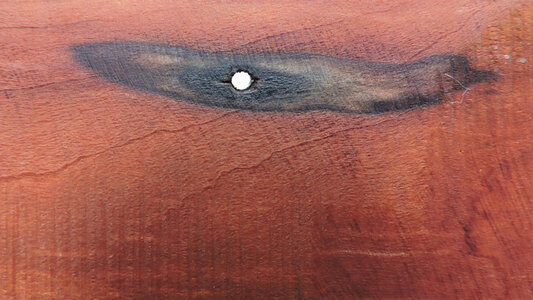
i never used treenails on models so i really never had a reason to drill tiny holes.
i think i will try a under $10.00 pin vice and see how it works
this is what happens when you use ferrous metal nails in some types of wood. I am not sure if brass plated nails will stop the reaction between ferrous metals and wood.

As I am slowly getting back into modeling after a long absence I have spent hours lurking S. O. S reading build logs. Repeatedly the issue of fastenings comes up usually with documentation supporting the authors point of view and often supporting one sort of fastener over another. (Forgive me up front for the simplification of dozens of posts.) So I guess it is time to throw my 2 cents into the pot!
Incidentally, I joined the NRG when I started out modeling and attended a presentation by Hahn at Mystic Seaport. His work seemed amazing to me and also personally unobtainable. Judging by what I see on the forum such workmanship has become, if not commonplace, at least not unusual.
But back to fasteners. I am not a naval historian but I lived aboard sailboats for 35 years, worked in and for various boatyards that worked or built wooden boats and learned a bit about fastenings in the marine environment.
"Modern" wooden boats and yachts (1900 to present) were /are fastened with bronze, galvanized steel, or copper. Stainless fasteners not suitable for in use damp or immersed situations ie hulls. Bronze is durable (~20 yr) as is copper riviting but both are expensive. Galvanized fasteners are inexpensive but may only last 10-15 years. For a fishing boat with a working life of 10 years galvanized made sense. For a yacht with a projected life of 20+ years the cost of bronze makes sense.
Both bronze and galvanized need to be protected by a wooden bung (plug) to prevent degradation. If a galvanized fastener were not protected a hull would be streaked with rust within a year or two. It is possible forged iron might do better but that is out of my experience.
My point is that use and economics often dictate the choice of fastener.
Few to my knowledge are building new vessels with treenails but they have several advantages. Driven correctly they swell when wet and make a very strong durable fastening. When repairing such a vessel and boring for new fastenings there is also no worry about running into some unanticipated piece of drift or iron fastening. Unfortunately proper woods are becoming expensive and production of the treenails is labor intensive.
As an aside the Bluenose II is, I believe, galvanized fastened. According to an expert acquaintence, for what they spent on rudder design and repair they could have fastened her with locust treenails and have greatly extended her life.
As anecdotal fastener information I can offer the following. I have poked around a lot of "wrecks" (usually just planked sections of hull). Most were from coastal vessels from the late 1800's to early 1900's. Some around Ocracoke Island, NC, USA and also Maine, USA, and Nova Scotia, CA. On these scraps treenails were common as were many Iron drifts and bolts. There were undoubtedly spikes too but my memory fails me there. My take away is that various fastening types were used depending on where the fasteners were located in the vessel and that determined the properties required of the fastener. Deadwood gets drifted together, hatch comings don't require that.
To me a model is a means to appreciate the lines of a vessel. How fine is the entry? How would the water depart her stern? How has her use dictated her shape? How much is she a product of tradition or technology? The rest is usually just determined by my eye-hand coordination
Fair winds, and if any of this comes across as a rant, I apologize. That is not my intent!
Ed
Incidentally, I joined the NRG when I started out modeling and attended a presentation by Hahn at Mystic Seaport. His work seemed amazing to me and also personally unobtainable. Judging by what I see on the forum such workmanship has become, if not commonplace, at least not unusual.
But back to fasteners. I am not a naval historian but I lived aboard sailboats for 35 years, worked in and for various boatyards that worked or built wooden boats and learned a bit about fastenings in the marine environment.
"Modern" wooden boats and yachts (1900 to present) were /are fastened with bronze, galvanized steel, or copper. Stainless fasteners not suitable for in use damp or immersed situations ie hulls. Bronze is durable (~20 yr) as is copper riviting but both are expensive. Galvanized fasteners are inexpensive but may only last 10-15 years. For a fishing boat with a working life of 10 years galvanized made sense. For a yacht with a projected life of 20+ years the cost of bronze makes sense.
Both bronze and galvanized need to be protected by a wooden bung (plug) to prevent degradation. If a galvanized fastener were not protected a hull would be streaked with rust within a year or two. It is possible forged iron might do better but that is out of my experience.
My point is that use and economics often dictate the choice of fastener.
Few to my knowledge are building new vessels with treenails but they have several advantages. Driven correctly they swell when wet and make a very strong durable fastening. When repairing such a vessel and boring for new fastenings there is also no worry about running into some unanticipated piece of drift or iron fastening. Unfortunately proper woods are becoming expensive and production of the treenails is labor intensive.
As an aside the Bluenose II is, I believe, galvanized fastened. According to an expert acquaintence, for what they spent on rudder design and repair they could have fastened her with locust treenails and have greatly extended her life.
As anecdotal fastener information I can offer the following. I have poked around a lot of "wrecks" (usually just planked sections of hull). Most were from coastal vessels from the late 1800's to early 1900's. Some around Ocracoke Island, NC, USA and also Maine, USA, and Nova Scotia, CA. On these scraps treenails were common as were many Iron drifts and bolts. There were undoubtedly spikes too but my memory fails me there. My take away is that various fastening types were used depending on where the fasteners were located in the vessel and that determined the properties required of the fastener. Deadwood gets drifted together, hatch comings don't require that.
To me a model is a means to appreciate the lines of a vessel. How fine is the entry? How would the water depart her stern? How has her use dictated her shape? How much is she a product of tradition or technology? The rest is usually just determined by my eye-hand coordination
Fair winds, and if any of this comes across as a rant, I apologize. That is not my intent!
Ed
The brass colored nails I received with my AL kit and the current OcCre kit I am building are magntic. I will not use them. And I think they're too big as to scale. I have anther method in mind.Hi Dave!
View attachment 285386
I have to agree with you on your concerns about iron nails.
View attachment 285385
Today, however, most copper-, brass nails and brass wires are not iron. Here a test with magnets.
Best regards
Thomas
- Joined
- Dec 1, 2016
- Messages
- 6,338
- Points
- 728

i tested the nails from Dry Dock Models and they do not react to a magnet so they are the real deal and not a plated.
- Joined
- Dec 1, 2016
- Messages
- 6,338
- Points
- 728

Fair winds, and if any of this comes across as a rant, I apologize. That is not my intent!
not at all it is a good post
not at all it is a good post
- Joined
- Dec 1, 2016
- Messages
- 6,338
- Points
- 728

in model building this is of no concern but in the days of wooden ship building i wonder if the shipwrights knew this.
perhaps why they used copper drift bolts but why not use copper spikes rather than iron? might of been the cost.
or maybe it was the paint that protected the spikes.
Will an iron nail rust in salt water faster than in fresh water?
The corrosion of iron indicates a chemical change in the metal. Rust (hydrous oxide) is an example of this change that results when iron is exposed to water or damp air. A thin film of oxide forms on the iron; this actually protects the metal from further corrosion by slowing the rate of oxidation. Where salt is present, electrochemical corrosion occurs, and the protective oxide film does not form, thus the corrosion (buildup of rust) continues unchecked. Your iron nail will indeed rust more quickly and severely in salt water.
perhaps why they used copper drift bolts but why not use copper spikes rather than iron? might of been the cost.
or maybe it was the paint that protected the spikes.
Will an iron nail rust in salt water faster than in fresh water?
The corrosion of iron indicates a chemical change in the metal. Rust (hydrous oxide) is an example of this change that results when iron is exposed to water or damp air. A thin film of oxide forms on the iron; this actually protects the metal from further corrosion by slowing the rate of oxidation. Where salt is present, electrochemical corrosion occurs, and the protective oxide film does not form, thus the corrosion (buildup of rust) continues unchecked. Your iron nail will indeed rust more quickly and severely in salt water.
Not Ferrous Oxide huh?in model building this is of no concern but in the days of wooden ship building i wonder if the shipwrights knew this.
perhaps why they used copper drift bolts but why not use copper spikes rather than iron? might of been the cost.
or maybe it was the paint that protected the spikes.
Will an iron nail rust in salt water faster than in fresh water?
The corrosion of iron indicates a chemical change in the metal. Rust (hydrous oxide) is an example of this change that results when iron is exposed to water or damp air. A thin film of oxide forms on the iron; this actually protects the metal from further corrosion by slowing the rate of oxidation. Where salt is present, electrochemical corrosion occurs, and the protective oxide film does not form, thus the corrosion (buildup of rust) continues unchecked. Your iron nail will indeed rust more quickly and severely in salt water.
I am working with uncertain memories here but I believe copper fastenings were used in the USS Constitution. Possibly originally supplied by Revere? I also seem to recall that during one refit school children supplied pennies to provide material for fastenings. Can anyone corroborate this?in model building this is of no concern but in the days of wooden ship building i wonder if the shipwrights knew this.
perhaps why they used copper drift bolts but why not use copper spikes rather than iron? might of been the cost.
or maybe it was the paint that protected the spikes.
Will an iron nail rust in salt water faster than in fresh water?
The corrosion of iron indicates a chemical change in the metal. Rust (hydrous oxide) is an example of this change that results when iron is exposed to water or damp air. A thin film of oxide forms on the iron; this actually protects the metal from further corrosion by slowing the rate of oxidation. Where salt is present, electrochemical corrosion occurs, and the protective oxide film does not form, thus the corrosion (buildup of rust) continues unchecked. Your iron nail will indeed rust more quickly and severely in salt water.
Certainly galvanized fasteners corrode much more quickly in salt water than fresh. On the other hand salt water prevents wood rot and fresh water accelerates it. You win, you loose.
Ed
- Joined
- Dec 1, 2016
- Messages
- 6,338
- Points
- 728

I am working with uncertain memories here but I believe copper fastenings were used in the USS Constitution. Possibly originally supplied by Revere? I also seem to recall that during one refit school children supplied pennies to provide material for fastenings. Can anyone corroborate this?
Certainly galvanized fasteners corrode much more quickly in salt water than fresh. On the other hand salt water prevents wood rot and fresh water accelerates it. You win, you loose.
Ed

A Copper Confessional - USS Constitution Museum
In 2015, we wrote an article detailing the saga of the copper bolts used to construct USS Constitution in the 1790s. For years, many people. . .

